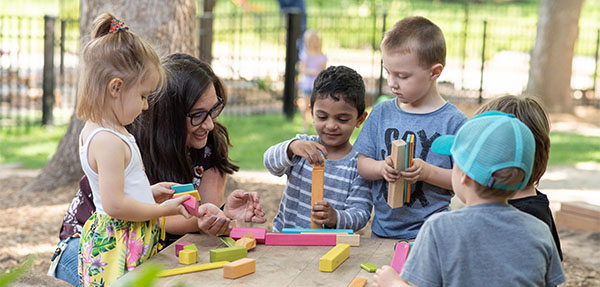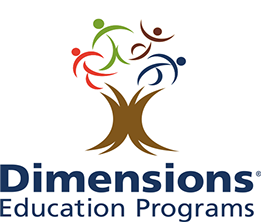
Our History
A brief history of Dimensions Educational Research Foundation
We like to think of Dimensions Educational Research Foundation as a wise old oak tree with deep roots in research that feed the whole organization and inform the work of those in our broad network.
At Dimensions we are serious about children’s learning. We understand the value of quality care and education during the early years and recognize that it is through close observation of children that we learn and grow as educators.
Our Roots in Research
In 1996, Dimensions Education Programs initiated a research project in collaboration with the University of Nebraska-Lincoln that investigated visual-spatial learning in preschool and elementary-aged children. The research also explored teacher interventions that might address children’s behaviors in light of the rise in diagnoses of attention deficit disorders and other similar behavioral challenges. Soon, researchers began identifying a positive link between time spent outdoors in nature-filled settings and children’s calmer, more focused behavior. Researchers also identified links between natural outdoor learning and children’s increased skill development in all areas.
As the project received more funding, its scope grew and in 1998 a team of researchers and educators formed the Dimensions Educational Research Foundation. Research was conducted collaboratively with the University of Nebraska-Lincoln as Dimensions Education Programs faculty attended education programs at UNL and worked with professionals from diverse specialties such as architecture, music, mathematics and kinesiology. This early collaboration led to the formation of an expanded multi-disciplinary team that included the addition of professionals such as neuropsychologists, landscape architects, professors of early childhood special education, teacher-educators and both qualitative and quantitative researchers.
The research then grew to include collaborations with other colleges and universities. The cornerstone of all of Dimensions Foundation work is the use of a rigorous research methodology that is based on close observation of children over time. As research began pointing more to the comprehensive benefits children received from spending time learning in and with nature, the focus of the research steered more singularly in that direction.
Our original Dimensions research work remains grounded in close observation of children. Our model relies on the expertise of teachers who are trained in early childhood development and qualitative research—individuals who know children well and are reflective practitioners striving to create opportunities to learn and grow themselves along with the children and families they serve.
Current major research initiatives include a multi-year study conducted by the University of Wisconsin, to assess the effectiveness of Certified Nature Explore Classrooms and Outdoor Classroom Project sites. This research is an expanded version of a pilot study conducted by Dr. Sam Dennis and colleagues from the University of Wisconsin’s Environmental Design Laboratory. An advisory board for this study includes researchers from Yale University and the University of Illinois and from organizations such as the U.S. Forest Service and the National Head Start office. Not surprisingly, results indicate that, “Compared to both indoor and traditional playgrounds, children in outdoor natural settings were reported to be more relaxed, happier, less impulsive, more focused and more creative.”
Our Billowing Branches- Education Programs, Exchange, and Nature Explore
Dimensions Education Programs serves as a primary research site with two early childhood education programs in Lincoln, Nebraska. Here we provide high quality, nature-based, authentic education for children ages 6 weeks to 5 years.
Based on this research and others, Nature Explore provides educator workshops, outdoor classroom design consultations and resources created to support programs nationally as they continue to connect children with the natural world. There are nearly 500 Certified Nature Explore Classrooms across the country in nature centers, early childhood programs, schools, museums, churches and health care facilities. Nature Explore Classrooms enrich lives anywhere children spend their days.
As part of Dimensions Foundation, Exchange Press supports early education professionals worldwide in their efforts to craft thriving learning environments for children and the adults through the creation of a quarterly magazine, book titles, and training resources.
Our Leaves and Blooms- The Children and Educators
Dimensions Education Programs serves as a primary research site with two early childhood education programs in Lincoln, Nebraska. Here we use qualitative research methods implemented by well-trained teacher co-researchers who are life-long learners themselves. These educators are thirsty for information they can use to inform their craft. Over the years, they have practiced the cycle of teaching, reflecting, and documenting.
Since 1968 Dimensions Education Programs has been a leader in Lincoln’s Early Childhood scene. We currently serve more than 200 families and continuously support other early childhood programs in our community. We celebrate diversity and strive for a future where every child has access to great early childhood experiences and we are able to do this through the support of Prosper Lincoln, the Lincoln Littles Campaign, and the Mae Whitmer Early Childhood Fund.
Our philosophy is to provide a hands-on, experiential approach to learning. Through inspiring environments, quality materials and exemplary teachers, children initiate their own curriculum opportunities to:
- Develop a foundation for life-long learning
- Grow socially by practicing problem solving, negotiation and group participation
- Develop compassion and empathy for others, a positive sense of self and an appreciation for cultural diversity
- Learn about wellness including physical development, healthy eating and body competence
- Cultivate intellectual development through investigation and discovery of math and science concepts with teacher support
- Experience language and literacy through exposure to quality literature, carried writing opportunities and introduction to languages other than English.
- Discover the arts including music, creative movement and visual arts
We are inspired by many educational approaches including the Reggio Emilia philosophy of learning, the High Scope Foundation Early Education Curriculum and our own ongoing research. With a constructivist approach to learning, our program improves and grows as our children and educators research, reflect and live in the natural world. A pluralistic mentality and an appreciation for all people and cultures is encouraged. Divergent thinking is valued as the children are supported in using their own good ideas and creativity.
